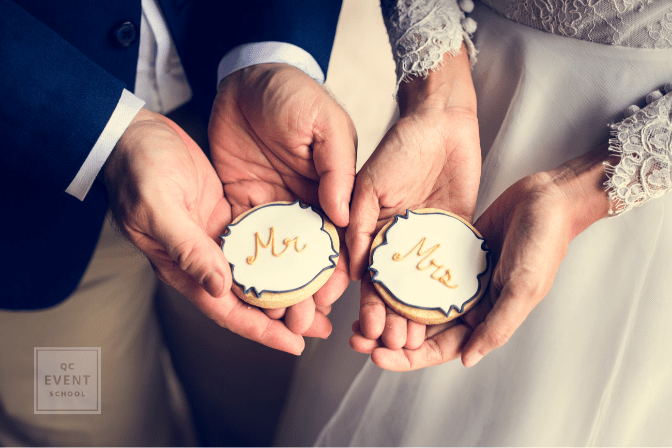
Business, From the Experts, Your Event Career
10 Templates All Wedding Event Planners Should Have Ready
Amira Harris is the owner and destination wedding specialist of Aisle Travel™ based in Calgary, Alberta Canada. Aisle Travel™ provides Canadian couples with full group travel services, destination wedding planning, and customized wedding group experiences. Today, she shares her insight on 10 templates that all wedding event planners should have ready and in their arsenal – especially during client consultations.
When starting a wedding planning business, it’s natural that you’d just want to run out (even with little preparation) and land your first client. While this is understandable, this isn’t a realistic way of growing your business. Patience, and putting in the work, is key. First, you will need to set up your business and get all of your templates in order. This is essential, because when you do have a client consultation, you will then be fully equipped and feel more confident in your offers.
The follow are 10 templates that, in my professional opinion, all wedding event planners should have ready:
1. Initial client consult form
This is the form you’ll typically start a consultation with. On it, there will be a list of prepared questions for the client(s). During and after the meeting, you’ll add notes based on what is discussed. The questions and the notes should aim to gather as much information as possible about the event: everything from the theme, to the time-frame of the wedding, to how they envision their big day, etc.
2. Wedding planning contract
Regardless of whether you’re being hired for full wedding services, a partial planning, or even just a month of service, a contract is always going to be required. In this contract, it should state what services are being provided, and what the agreed-upon payment terms are. It should also include a detailed list of all the duties that are included. Having a contract template is important, as it keeps both you and your clients legally safe – but also accountable!
The nice thing is that you can create a basic skeleton template of this contract, and then simply modify it in the future, depending on the client and their needs (since some services may not always be required). A contract covers both parties, and is absolutely crucial to have signed before any work is started.
3. Detailed on-boarding form/questionnaire
After the initial meeting and the contract is signed, an on-boarding document – or questionnaire – is crucial. This is something you will provide to your clients so that they know what to expect while working with you. In it, it should cover:
- Meeting expectations
- Business hours
- How to get in touch with you
- Holiday and vacation policies
- Tools you will provide and collaborate on
- The next steps of the planning process
Remember: the more your clients know, the easier it is to work together.
4. Wedding planning checklist
Whether the wedding is 6 months from now or two years, this flexible template can be customized for any time-frame. It’ll provide you a list of tasks that must be completed during the planning stages, in their allocated time-frame. This is a very important template to have, as it keeps everyone on track during the planning phase.
5. Wedding budget spreadsheet
This template is essential! A wedding budget spreadsheet keeps you on track with your spending. You can also refer back to it to make sure you and your clients are staying on budget, so it’s imperative to keep it accurately updated! This way, you and your clients always know where the budget sits.
6. Vendor/Supplier contact and checklist
On this template, you’ll list all of your hired vendors’ and suppliers’ contact information. This information will include:
- Names of the vendors/suppliers
- Phone numbers
- Email addresses
- The service they are providing
Here’s an example of how this might be written out: [Photographer’s name or business name] booked for 10 hours, arrival time: 9:30 am in bride’s room, for getting ready pictures.
7. VIP Contact list
This list will contain the contact information of the the couple, the wedding party, and the couple’s immediately family members. This way, if they need to be contacted for any reason, it’s all available and already on-hand for you.
8. Guest list
The number of invites sent out for a wedding can be relatively short, or grow to include over 100+ people! As they start to accept or decline the invitation, it can become impossible to keep track of who intends to come. This template is a must, as it will help you and your clients keep track of who’s been invited, and then who has RSVP’d or declined. It’s also used to note anyone who may have any special/dietary meal requests. Keeping on top of your clients’ guest list is important – not just to keep the couple in-the-know, but so that you can ensure they stay on budget.
9. Packing list
As wedding event planners, we should always have an emergency kit with us on wedding days. After all, there are tons of unforeseen emergencies or hiccups that may happen!
Loose button? Fabric tape? Nail glue? We have it all covered in our kits so that the couple doesn’t have to worry about a thing. For each wedding you organize, you should use a packing list template to list all the items that the couple will need on their big day. Then, as you pack each one into your emergency kit, you can check it off, so you know you have it.
Things on a packing list can include (but aren’t limited to):
- A nice dress hanger for the getting ready photos
- A veil
- Shoes
- A suit
- Jewelry
- Wedding dress undergarments, and so on!
10. The day-of timeline
This is undoubtedly the most IMPORTANT document for the big day. Every last detail is scheduled on this template, to ensure everything is present and on time. The wedding event planner will take care of things in the background! This way, the couple can enjoy their big day with zero concern about all these other details. It’s our job to make things as seamless and stress-free as possible.
Pro tip: QC Event School offers and comprehensive, free wedding day timeline template, which you can download here!
It may not be explicitly listed in our job description, but all wedding event planners know that we always come equipped on wedding days with list, after list, after list! These templates anticipate the needs of the client, and ensure that you’ve got everything you need to fully execute the couple’s big day. This is why it’s SO important to put the work in early on: so that you’re ready when the time does come – and it will. This way, when you do have a client, you have your templates ready to go, the process is all set, and you’re ready to hit the ground running.
After all, being fully equip, knowledgeable, and organized is why couple’s hire wedding planners!




